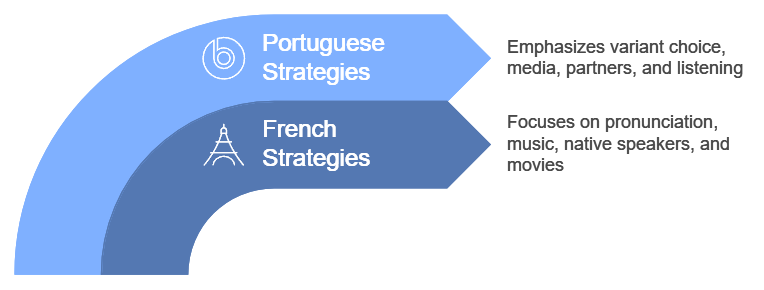Learning French vs Portuguese: Which Language is Easier?
For English speakers, French and Portuguese are equally challenging, both requiring about 600-750 hours to reach basic fluency. However, your native language, learning goals, and preferred learning style will make one easier than the other for you personally. Let’s explore which might be your better choice!
Key Takeaways
- Both languages take similar time to learn (600-750 hours)
- Portuguese has more familiar pronunciation for English speakers
- French offers more learning resources
- Both languages provide strong career benefits
- Regional variations significantly impact learning choices
Romance Language Advantages
Both languages come from Latin, which gives you some instant benefits. Here’s what you get “for free”:
| Feature | French | Portuguese |
|---|---|---|
| English Cognates | 45% | 35% |
| Grammar Structure | Similar to English | Similar to English |
| Alphabet | Same as English | Same as English |
| Global Speakers | 275 million | 250 million |
Time Investment Analysis
Let’s break down what your learning journey might look like:
Learning Timeline:
| Level | French | Portuguese |
|---|---|---|
| Basic (A1) | 3 months | 3 months |
| Intermediate (B1) | 8 months | 8 months |
| Advanced (C1) | 18 months | 18 months |
Grammar Face-Off
Think all Romance languages have the same grammar? Think again!
French Grammar Features:
- 2 genders (masculine/feminine)
- 14 verb tenses
- Complex pronunciation rules
- Strict word order
Portuguese Grammar Features:
- 2 genders (masculine/feminine)
- 11 verb tenses
- More phonetic pronunciation
- Flexible word order
Pronunciation Challenges
Here’s where these languages really differ:
| Sound Feature | French | Portuguese |
|---|---|---|
| Silent Letters | Many | Few |
| Nasal Sounds | Complex | Simpler |
| Stress Rules | Fixed | Variable |
| Regional Variations | Moderate | Significant |
Regional Variations Impact
Which version should you learn? Here’s a quick guide:
French Options:
- Standard (Parisian) French: Most widely taught
- Canadian French: Growing job market
- African French: Emerging opportunities
Portuguese Choices:
- Brazilian Portuguese: Largest speaker population
- European Portuguese: EU access
- African Portuguese: Emerging markets
Modern Learning Approaches
Today’s learners have more tools than ever:
| Resource Type | French Availability | Portuguese Availability |
|---|---|---|
| Mobile Apps | Extensive | Growing |
| Online Courses | Abundant | Moderate |
| AI Tools | Many | Limited |
| Native Content | Extensive | Growing |
Professional Opportunities
Both languages can boost your career:
French Benefits:
- 25% average salary increase
- Access to 29 countries
- Strong in luxury and diplomacy
Portuguese Benefits:
- 20% average salary increase
- Access to 9 countries
- Strong in emerging markets
Success Strategies
Want to make your learning journey easier? Follow these proven tips:
- For French:
- Focus on pronunciation first
- Use music for learning
- Practice with native speakers
- Watch French movies with subtitles
- For Portuguese:
- Choose your variant early
- Use Brazilian media
- Practice with language partners
- Focus on listening skills

Making Your Choice
Still wondering which to pick? Ask yourself:
- Want more learning resources? Choose French
- Interested in South America? Pick Portuguese
- Need it for European business? French might be better
- Love Brazilian culture? Portuguese is your path
- Want more global reach? French has a slight edge
- Prefer phonetic pronunciation? Portuguese wins
The Bottom Line
Both French and Portuguese offer unique advantages and challenges. Your success depends more on your:
- Learning style
- Time commitment
- Cultural interests
- Career goals
Remember, the “easier” language is the one that motivates you most! Consider these final factors:
| Factor | French | Portuguese |
|---|---|---|
| Learning Resources | Very High | Moderate |
| Job Opportunities | Abundant | Growing |
| Cultural Access | Extensive | Rich |
| Global Influence | Strong | Expanding |
Ready to start? Pick the language that excites you most – passion beats theoretical ease every time! Whether you choose the elegance of French or the warmth of Portuguese, your success depends more on your commitment than the language’s inherent difficulty.
Want to know the secret to success? Choose the language that makes you think “I can’t wait to learn this!” rather than “This seems easier.” After all, you’ll be spending hundreds of hours with your chosen language – make sure it’s one that truly interests you!
